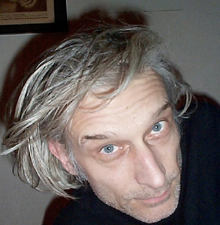 Notes: in July 2008 Paul Kendall agreed to do a written interview with me for RECOIL19.NET. But it wasn't until December that it was finally done as Paul had been very busy.
Notes: in July 2008 Paul Kendall agreed to do a written interview with me for RECOIL19.NET. But it wasn't until December that it was finally done as Paul had been very busy.
A very few questions came from members of the DEPMOD forum (names stated in brackets).
Paul Kendall began his obsession with sound from an early age, after hearing the possibilities of vari-speed on a tape-recorder. Although studying mathematics at York University, his reason for going there was the profile of the electronic music department.
During this one year period he learnt how sound could be manipulated.
Then he returned to London for a nine year period working in a bank! By chance Paul met Daniel Miller of Mute Records and found they shared a love of electro-acoustic music. At this time the first "affordable" multitrack tape machine was produced by Fostex, B16. Daniel invited Paul to assist in setting up a studio for Mute artists' to use. It wasn't too long before he started engineering for different Mute artists. His reputation progressed over a number of years working on very diverse projects.
In 1996 the Parallel Series was launched to allow Paul to return to his first musical love, electro-acoustic. Finally in 1997 he left Mute to have more time to develop his composition and his two children.
PERSONAL...
How is your family doing? You have two kids, right?
Paul Kendall: 2 kids, daughter 16, son 15.
How did you get into music business?
I was born in the mid 50s just as youth culture was emerging and through my obsession with the space age everything appeared new and out there somewhere. I liked the music that sounded from another planet, Joe Meek, for example, was looking for new sounds and these appealed to me as did the first time I heard a voice recorded on a tape machine and then played back at half speed. These are the memories of an 8 year old kid. The music evolved into a love for psychedelic groups like Pink Floyd (first 2 albums only) and The Move, John's Children, Keith West, Vanilla Fudge etc. By 13 we had our first band playing blues until one of our mates made a single oscillator synth which meant we could eventually progress onto Hawkwind covers ("Master Of The Universe", I believe).
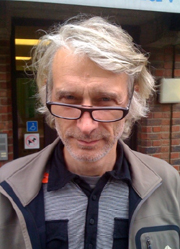 During this period I would: sing, badly; play harmonica, not bad; hit bongoes, erratically; and blow descant recorder/flute and eventually the saxophone, very noisily. More importantly I had a tape recorder which became increasingly more satisfying than playing an instrument.
During this period I would: sing, badly; play harmonica, not bad; hit bongoes, erratically; and blow descant recorder/flute and eventually the saxophone, very noisily. More importantly I had a tape recorder which became increasingly more satisfying than playing an instrument.
At 18 I left school to go to university to study maths. I chose York as it had the most respected electronic music department in UK. By the time I arrived up there I'd managed to formulate a multi-media composition, for mime artist/ 6 dancers/ electronic tape/ free improvising Jazz trio! The music department at York agreed to stage this lunacy and for some reason they thought that I understood music. I tried to switch from maths to music but they eventually realised that I knew nothing about solfège, I was just interested in sound.
However for 9 months they allowed me to use a couple of Revox A77 tape machines and a VCS3 synth, this was 1974 so cutting edge! So I was kicked out of university wanting to be a serious electronic music composer and got a job in a bank for the next 9 years.
The bank was wonderful as it allowed me to live comfortably and be able to think about more creative things at the same time. With 2 friends we built a small rehearsal studio in a Covent Garden basement, with 3 Revoxes and a WEM copycat and an Alice mixer, taught ourselves recording and then started to record bands.
I married the singer of one such group and eventually Joni joined Fad Gadget and I met Daniel Miller. We shared an interest in classical electronic music and recording technology was just about to become almost affordable. This was 1983-4 and I left the bank and bought a Fostex B16/ Allen & Heath mixer/ DX7/ Drumtraks/ BBC micro computer with UMI sequencing, electrospace time matrix and a noise gate.
Daniel was thinking of setting up a studio facility for Mute with similar technology and I slipped in to help out and appear to have stayed there for the next 12 years. I left Mute to pursue a more focussed pro-tools discipline and I have been pretty much fixed in front of a Mac until this moment and it is unlikely to change.
Did you have any training in your childhood to play any instrument?
No real formal training.
What is your favorite music?
Over 50 years I have enjoyed lots of different styles!!
Small Faces/ The Who/ The Beatles/ Jimi Hendrix/ Soft Machine/ Hatfield And The North/ Stravinsky/ Bartok/ Frank Zappa/ Varese/ Stockhausen/ Roy Harper/ John Martyn/ Evan Parker/ Escalator Over The Hill/ John Coltrane/ Kraftwerk/ Henry Cow/ Wire/ Propaganda/ and then we come to a stop when I start to work professionally in a studio. So since 1984 I find it virtually impossible to be sure what I actually like. I listen with different ears. Now I just love voices and sound. Frank Sinatra to Pan Sonic.
Favorite places? (You lived some time in Paris recently)
Any space with good communication potential and room for my portable mind. Paris was important, it felt like coming home to the birthplace of musique concrete.
Favorite drink/food?
Don't really drink, although during my folk period I was a member of the campaign for real ale (Camra), started smoking a pipe, which complemented the beard in my long cardigan. After folk music I discarded the pipe/ beard/ cardigan. I'm English don't ask about food.
What does Paul Kendall do in his spare time?
Listen to voices speaking.
MUSIC...
Your own music (Piquet, The Digital Intervention, etc.) isn't that kind of stuff to be running somewhere in the background. The listener has definitely to "explore" all the Parallel Series releases and that's fascinating. What are the important aspects for you when you create any track?
All answers would be lies. I have no idea just a result of lots of information filters clicking at the good moment. I always wanted to organise sound but there is no method and normally it takes me years of self-doubt.
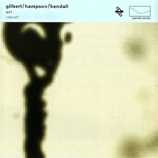
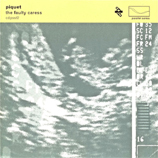
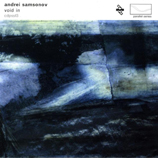
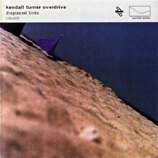
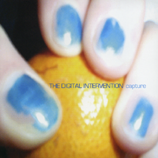
How do you approach any new song? Do you have any melody in mind or do you develop any new track playing around with certain sounds you created?
Don't really make songs for myself. Often it comes from a fragment of something else, or recently from a new plug-in or software thing. Everything tends to be small studies on this or that.
Most of your music is rather non-rhythmic - does that come naturally?
Sir, that question is class. I cannot/ do not/ should not DANCE. So, as a committed devotee of horizontal dancing my non-rhythmic music comes completely naturally.
I remember you once said that you created the tracks for The Digital Intervention's "Capture" album on your laptop. What equipment (hardware/software) do you use?
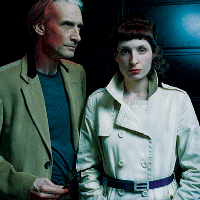 I had to sell my pro-tools at that point so I was using "Logic" on a Mac as my basic set-up. Software was predominantly "Reaktor" and a brilliant sonic destroyer called "Thonk". "Thonk" is no longer available to me as OS9 is just a distant nostalgic memory.
I had to sell my pro-tools at that point so I was using "Logic" on a Mac as my basic set-up. Software was predominantly "Reaktor" and a brilliant sonic destroyer called "Thonk". "Thonk" is no longer available to me as OS9 is just a distant nostalgic memory.
I suppose doing a cover version of 1930's "La Coco" was an idea/choice of Olivia. Did you do any other covers in the past as a recording artist?
It was certainly Olivia's choice of song but we both knew that the album needed something from another world to focus the rest of the hullabaloo.
Do you have any plans to do another Digital Intervention-project with Olivia Louvel?
Olivia is extremely concentrated on her own journey at present, but maybe.
Alan published an article recently about today's music industry entitled "Music For The Masses - I think not" - did you have a read? If yes, any comments about it?
His reasoning was excellent. I'm just concerned that our bite-sized world is disappearing loudly into the ether.
Where do you think music industry will go the next years? CD sales go back dramatically - a lot of artists start to spread their music on their own via the internet resp. use different channels for distribution.
Whatever we think it will not or should not affect creativity. It will affect record companies but then they aren't particularly creative (majors) except with their contracts and accounts. It affects me as an engineer because there is less money available to pay for another level of creation on top of the artist.
For artists it is much more complex although we are only talking about money. It is easy for the oft quoted Radiohead to make the advertising gesture of a free download knowing that through extra publicity/merchandising and concert fees they will see very little change in their overall income. For touring bands in general the situation isn't catastrophic, people will still have to pay to see concerts. For predominantly recording artists, the situation isn't great but we are an adaptable species and some will survive.
You played some live gigs in the past (e.g. Andrei Samsonov, Olivia Louvel) - do you particularly enjoy being on stage?
In some ways I'd like to do more "live" things. Many years ago I did a few "electronic" poetry moments. Which was nice! But, as with playing in bands in my youth, I seem to prefer controlling the sound rather than standing on-stage creating it.
You started the "Parallel Series" in 1996 on the Mute label. After Mute didn't want to carry on with it and the release of "Capture" on the 0101 label do you have any plans to do another release for the "Parallel Series"?
Not really, which is a shame because the name "Parallel Series" is total genius. It was in a Thai restaurant near Mute when Daniel Miller suggested the name, the meal was excellent but the name is sublime.
Are you currently working on any project?
Always, refining my own bits, mixing odd things, preparing a couple of radio things. Preparing for a live Louvel in Paris.
What has been your most interesting work/project? (Peter Degn, Denmark)
Virtually impossible to answer otherwise I would have stopped working. All projects, even the less satisfying, will contribute something to the evolving whirlpool. However, I do prefer to work on projects that include some aspect of voice. I have serious emotional problems over the human voice! Imperfection can be very seductive.
RECOIL...
How did you get in touch with Alan Wilder?
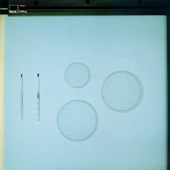 I was working for Mute so I knew Alan quite well on an office level, although I did play the harmonica part on "Personal Jesus". Miraculously transformed by Flood into a riff chomping groove.
I was working for Mute so I knew Alan quite well on an office level, although I did play the harmonica part on "Personal Jesus". Miraculously transformed by Flood into a riff chomping groove.
Alan had just finished "Unsound Methods" and was intending on remixing some tracks for 12" release. He came into Mute studio where I was twiddling with pro-tools and we did a remix. It is remarkable the impact of the first computer multitrack systems. How did we ever make records with analogue and no automation?
What aspects do you enjoy working with Alan?
It has never felt like work.
How would you describe your role within the Recoil project?
We both hear differently would be the quick answer. I do a bit of colouring on the side.
Do you feel that your contribution to Recoil is sometimes overlooked by Recoil followers?
Not at all.
What were the "easiest"/"most difficult" contributors to work with for the Recoil project in your opinion?
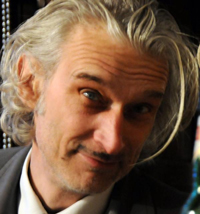 Difficult contributors don't contribute.
Difficult contributors don't contribute.
"Liquid" for me was like a wet dream, sorry I really couldn't resist that stupidity. But seriously, the women on "Liquid" made me begin my bloody voice obsession. I already knew Diamanda through Mute. She is a formidable singer/performer/woman and just as importantly is a pleasure to spend time with. Samantha and Nicole worked under duress and managed to survive the brief transplanting (New York to Sussex, darlings), Rosa and Sonja were ephemeral and perfect. And Dean tied a few ends down. And then there was the big Swiss fella, what's his name?
"subHuman" was entirely different as Alan and I went to Texas for the Joe Richardson session. I've written some stuff about that elsewhere, just to say that it was a cool place.
Any special/funny anecdote of a Recoil recording session you like to share?
I'd just like to take this opportunity to apologise for the moustache that for some reason I had during the "Liquid" sessions. I have seen the photograhic documentary evidence and I am ashamed. No idea what I was doing. Sorry. And it will not happen again.
Are you incorporated in the sounddesign for Recoil? (Oliver Thiede, Germany)
What Recoil track was most difficult to work on or has changed the most since the original incarnation? (Brian Schlegel, USA)
Yes, as I said earlier, this probably describes what I do, colouring. Alan's compositions don't need a lot of work by the time I hear them, they are well constructed and advanced. I just add bits of spatialisation, some effects and little twists.
I noticed parts/samples of The Digital Intervention's "La Louve" resp. "The Last Writes" on "subHuman's" "99 To Life" (especially on the "Reduction" version). Is Alan aware that these sounds are previous stuff from yourself? (there are no album-credits for this) In addition I noticed that the starting sound of Piquet's "Caress" sounds very much like Recoil's "Shunt". Did Alan use a sample of your track? (you weren't recording "Unsound Methods" already together)
The beauty of technology.
What Recoil track best defines what Recoil is? (Brian Schlegel, USA)
Alan's moved through various moods on his Recoil albums, should I have to define "what has become the perception of Recoil" then I would say "Strange Hours". I think it ticks lots of boxes. And then there is the male equivalent on "subHuman".
MUTE...
How did you get in touch with the Mute label?
Answered earlier, Fad Gadget.
You worked with a lot of Mute artists. Which project did you enjoy most? Any bad memories?
No bad memories of Mute but the moustache must have been a cry for help.
Would you like to share any "Mute-anecdote"? (Peter Degn, Denmark)
Not at moment, I am planning on doing a small aural tribute to Mute, which could be fun if I can begin to bare listening to my own recorded voice speaking. And if I kick my arse to do it.
How would you describe your relationship with Daniel Miller?
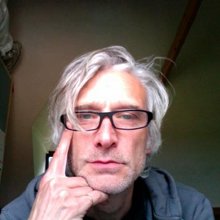 Daniel gave me the opportunity to try and express myself, for which I will be eternally grateful. There was a particular period, just after the move to Harrow Road, when the enormity of what Daniel was creating was extraordinary. Mute had existed to this point largely on Depeche/ Vince Clarke projects, then within a few months at 429 Harrow Road Mute/Daniel helped spawn 3 other labels:
Daniel gave me the opportunity to try and express myself, for which I will be eternally grateful. There was a particular period, just after the move to Harrow Road, when the enormity of what Daniel was creating was extraordinary. Mute had existed to this point largely on Depeche/ Vince Clarke projects, then within a few months at 429 Harrow Road Mute/Daniel helped spawn 3 other labels:
"Rhythm King" (S Express/ Bomb The Bass/ Betty Boo/ Renegade Soundwave);
"Blast First" (Sonic Youth/ Big Black/ Dinosaur Junior/ Butthole Surfers);
"Product Inc" (Swans/ Young Gods);
So you had all these varied artists plus the Mute acts including Nick Cave/ Nitzer Ebb/ Wire and then Erasure, who were about to commercially break, in one 800m² office space. Just for this experience alone, thanks Daniel.
It was an eclectic crossroad of beats/ synths/ guitars and wails. The line to Nirvana can be clearly drawn from Thurston Moore of Sonic Youth years later recommending Cobain to Geffen. A further knot tied when Steve Albini of Big Black produced for Nirvana. So many seeds sown in that period of time.
Did you work for artists of the Mute label again after your return from Paris?
Not a great amount, did a few live mixes for Goldfrapp DVDs whilst living in Paris.
Mute seems to be a shadow of itself these days - any presumptions if this label will be still around in a few years?
The name Mute will be around and remembered with good reason it is part of the history of popular music. It will never be what it was, it was constantly evolving anyway. Mute will only cease to exist when Daniel ceases to enjoy releasing artists he likes.
Thank you for the interview!
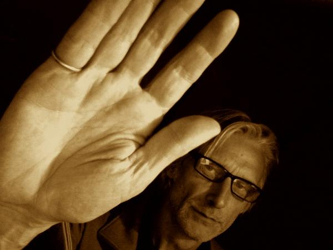
|
myspace.com/digitalintervention
END |